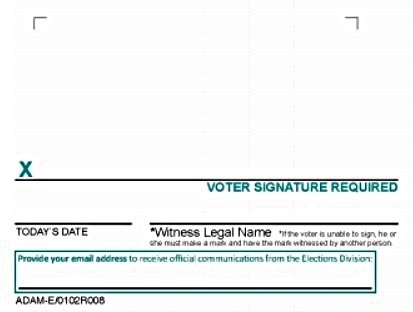
Signing Your X On The Line
One of the things that is easy to forget, especially when one is fond of literature, is that literacy is first required before one can enjoy it.
It’s an unhappy fact that illiteracy is still such a huge issue globally; that illiteracy rates exist at all in countries that can afford otherwise (I’m not going to pretend that education is not expensive — it is, regardless of who is footing the bill), it is appalling.
In the United States, if a person is unable to write — which does not necessarily mean they cannot read but the correlation exists in high percentages — but is eligible to vote (based on age and citizenship), that person can sign an X in lieu of their name on their ballot return. The signed X must be witnessed (see example above) and the witness’s signature becomes a guarantor. So luckily (kind of? I can’t really fathom that being unable to read or write would be lucky) there is some level of protection in place for “uneducated” people to be able to vote in my home country.
But what about accessing information?
And vetting information?
The former requiring systemic literacy (knowledge of systems) and the latter requiring media literacy (understanding source reliability, being aware of data and statistic falsities, and comprehending what fact-checking means). Content area literacy is required to make any kind of informed decision, and ‘content’ is not just academic; it is cultural, religious, sociological, economic, legal, business-focused, theoretic, linguistic, and social.
Impact
I work with adults who have low levels of literacy and with children who are developing literacy skills (or not, as the case may be — why learn to read when you can just watch or listen to information via zombie-fying devices?), and the statistics highlighted at the beginning of this article ring true to me:
- 79% of U.S. adults are literate (which means 21% are NOT)
- 54% of adults in the U.S. have a literacy rating below 6th grade level (age 12)
And if, by ‘literate’, these percentages are referring to BASIC literacy — Level 1 Literacy — it basically means that they can find the answer synonymous to the vocabulary requested in a question about a basic topic in a paragraph that uses low-level vocabulary.
Literacy in children is a whole ‘nother can of worms. It has to do with alphabetic awareness, phonological knowledge, vocabulary, cloze skills, ability to use age-level words appropriately, sentence and paragraph construction (and de-construction), and the successful application of ideas. I’ve seen varying statistics and they are not the simple kind; the most basic (and SAD) consistency I’ve found for literacy rates among U.S. children is that across the nation, kids are NOT reading at grade level.
Not Blaming, Not Complaining ~ Just Stating
I would love to say that I have an answer for all this. I don’t.
Blame can be placed in any number of directions on a multitude of responsible parties, but I don’t blame anyone. I don’t find that helpful.
All I can say is that literacy is important. Reading matters. Being able to write — down to the most basic writing exercise of signing your own name instead of an X on the line — makes a difference.
And if you are an educational warrior — if you are fighting to teach people of any age literacy on any level (in ANY language! please don’t think this is just about English!), despite the poison-tipped arrows of negativity the world aims your way — I raise my own shield to you.
.
Letter X
My A-to-Z Blogging Challenge posts this April are centered around the topic of READING.
To read additional posts from this series, see here.
For a look at what other participants are up to, click on the badge above.


I had a great uncle who couldn’t read. He was often sick as a child, missed a lot of school and had learning difficulties but I recall him copying his name to sign documents. Somehow he got a motorbike licence but he had trouble distinguishing the men’s from ladies toilets. It’s hard to imagine a life without reading or writing.
This is such an important and heart-breaking topic, and your post is a thoughtful and powerful reminder. Reading was literally a life saver for me when I was a child, and as an adult when I met my first illiterate person and saw what a difficult life they were leading, it sent me into quite a spinning existential crisis. Sometimes I think we are so inept as humans not to understand (or care) what the really important things are, and to make them genuine actionable priorities. And so, yes, yes, yes, kudos to everyone helping, and may everyone who needs assistance find it with ease and dignity.
I am glad we manage to put all our kids in school here, cos the government is a bit *whispers* [draconian]… but i am extremely saddened by the lack of literacy in parts of the (sometimes, even developed-) world. I can’t imagine a life without being able to read.
PS, i’ve taken my blog down for a bit cos Blogger was annoying me with spam, flagging single posts from a decade ago and I’ve had the sensitive warning put back up but it’s still spamming me with notifications. I’ll make it live again in about a week I think, let’s see when the emails stop!
Kids definitely go to school here; it’s required until age 16 (though attendance is an issue and second-language learners struggle) but honestly, school is not always the best place to learn.
Parents are first and best teachers — not best in terms of capability but in terms of being best placed and most mimicked — but when parents aren’t teaching, or at least reinforcing, it’s an uphill struggle.
That’s frustrating about your blog. I read your jewelry post; I haven’t been to a jewelry store in AGES but I do love shiny things! 🙂
It is true that there should be no excuse for illiteracy. It is vital for all of us to be able to make our own decisions and make them in an informed manner. I live in India and here there are still pockets of the country were schooling is not taken seriously owing to financial needs. Then there is a section that works as household help which against doesn’t deem this as an important need to be fulfilled. It is frustrating to see this but at the same time socio-economic conditions also become a huge deterrent in availing this resource.
Loved your thoughts on this and enjoyed reading it.
Shalini recently posted…Vellichor – Bookstores versus online portals
It’s complicated, isn’t it? And trying to avoid paternalistic attitudes is important. But so much could be better!